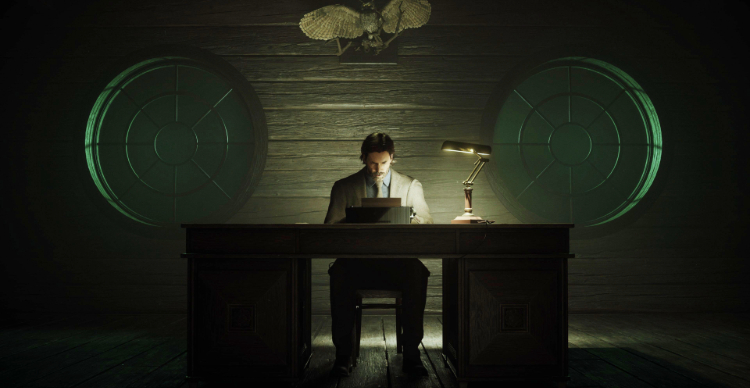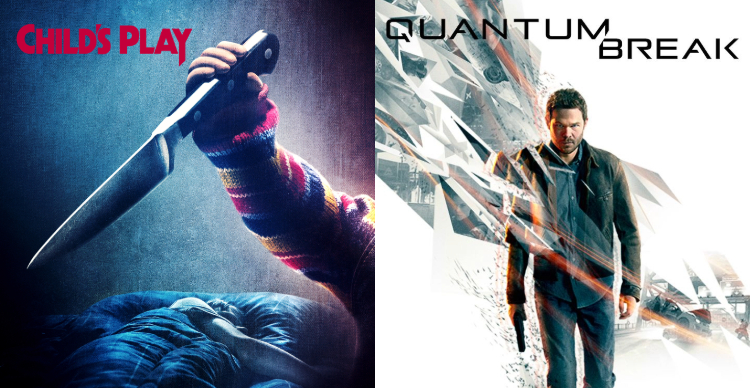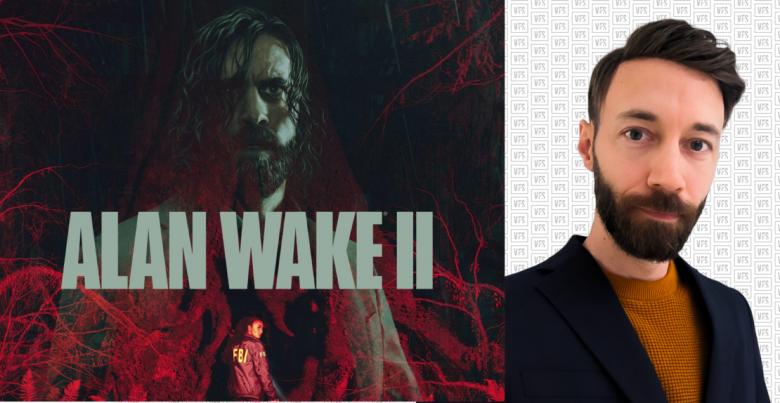We are truly in the golden age of gaming. Between the countless AAA titles released every year and the ever-expanding game libraries offered by services like Microsoft Game Pass and PlayStation Plus, video games have never been more accessible. If you’re like this gamer, you likely have trouble remembering every last title you’ve played in recent years. But what you’ll never forget is “That One Game” – the one that defined and shaped your love of gaming, likely in your youth (for me, it was Majora’s Mask). Sometimes, if we’re lucky, we get to relive this experience again as an adult.
For this gamer – it happened with Alan Wake 2.
So, imagine the excitement in discovering that an alum from Vancouver Film School’s Writing for Film, Television & Games program was a Senior Writer on the second installment of Remedy Entertainment’s beloved franchise. Though the game first released in 2023, we were blessed with the “Night Springs” Alan Wake 2 DLC on June 8, 2024, and now “The Lake House” DLC on October 22, keeping Alan and Saga’s journey alive.
Like all good things, however, Alan Wake 2 must come to an end. On the eve of the game’s final chapter being released, we were fortunate enough to catch up with Tyler, who graciously sat down with us to discuss his unforgettable experience in the world of game narrative design on Alan Wake 2, what it was like attending VFS, and to share game writing career advice.
 VFS Writing alum Tyler Burton Smith was one of three core writers on Remedy’s Alan Wake 2.
VFS Writing alum Tyler Burton Smith was one of three core writers on Remedy’s Alan Wake 2. Developed by Remedy Entertainment – the studio behind Control, Max Payne, and other visually-stunning games – Alan Wake 2 is a third-person survival horror game that introduces a new heroine: Saga Anderson (Melanie Liburd). Tasked with investigating a series of ritualistic murders in the sleepy town of Bright Falls with her colleague Alex Casey (Remedy’s own Sam Lake), Saga soon finds herself hunting down the Cult of the Tree and inadvertently freeing Alan Wake himself (voiced by Matthew Porretta and performed by the ridiculously handsome Ilkka Villi), who has been trapped for over a decade in an otherworldly realm called ‘the Overlap’. As the story progresses, Saga soon discovers that her fate, and the fate of those around her, is being altered by Alan Wake, whose writing holds unimaginable power.
The game was nothing short of a critical success. Praised as “a once-in-a-generation scarefest” by Tech Radar and “an imaginative and truly ambitious sequel” by GamesRadar+, the game went on to win three Game Awards, including Best Narrative, and two BAFTAs for Audio Achievement and Artistic Achievement.
With how Tyler’s career has taken off since graduating from VFS in 2010, it’s no wonder he ended up on the writing team for Alan Wake 2. With credits in both entertainment and games, Tyler’s work includes Child’s Play, Boy Kills World, and the game Quantum Break, which we have to believe lent itself directly to a project like Alan Wake 2! Tyler’s upcoming projects include Paramount’s Teenage Mutant Ninja Turtles: The Last Ronin, which he describes “a dream project”, a project with Argylle director Matthew Vaughn, and a title with Netflix which we unfortunately could not get the scoop on (no matter how hard we tried!).
 Tyler’s impressive body of work includes Child’s Play and Quantum Break, the latter of which shares similar narrative aspects to Alan Wake 2.
Tyler’s impressive body of work includes Child’s Play and Quantum Break, the latter of which shares similar narrative aspects to Alan Wake 2.As a Senior Writer on Remedy Entertainment's hit game Alan Wake 2, Tyler Burton Smith provided us with invaluable insights into the art of video game storytelling:
How did you land your role writing for video games on Alan Wake 2?
I was originally hired by Remedy to help develop an Alan Wake TV show pitch several years ago based on the original game. I worked with Remedy’s creative director on building out the story and the big question was always how to extend the story beyond the first game. What comes next? How do we create a narrative that can still surprise fans of the game?
We came up with some really exciting ideas to expand the game’s story, and I remember we kept saying “this would make for a really interesting sequel to the game.” That iteration of the TV show never moved forward, but a year later they greenlit a sequel to Alan Wake, so I was offered the chance to dive back in and build out the story and I jumped at the opportunity.
You and the entire creative team behind this game have created one of the most compelling, memorable games we’ve seen in a very long time. Of course, the narrative stands out as one of the most unique features. What was the writing process like?
I always believe in letting your imagination run wild and tossing out every insane stream-of-consciousness idea that spills out of your weird brain and then reining it all in after. That’s how we approached this. The important thing was always to eventually make sure that even the wildest ideas were there to service the story and the characters. We were just lucky that the basic premise of a writer spiraling through an existential crisis while rewriting reality with his words allows for some pretty twisted storytelling opportunities.
You’ve had past experience with the fusion of gaming and live action, via Quantum Break, but with the live action in Alan Wake 2 it was elevated to an entirely new level – a redefining of “the cut scene” (let’s not forget the musical in Initiation 4!). Was this an easy creative decision for the team, or did a lot of thought go into the live action element?
I think we learned a lot of lessons on Quantum Break about pairing live action with game narrative, and the goal for Alan Wake 2 was definitely to blend the two seamlessly. There was also a practical decision in leaning into live action. It’s much cheaper to produce than CG cutscenes. Alan Wake 2 didn’t have a massive cut scene budget like some other AAA titles, but we had some very ambitious storytelling goals, so the idea to blend live action sequences into the game allowed us to expand the scope of the story and add a lot of flavour to the world.
Similarly, Finland’s Fried Music created custom songs for the game (I’m not exaggerating when I say ‘Night Springs’ was playing on a loop in my head for months!). It really seems like no creative stone was unturned as Alan Wake 2 was developed?
The custom songs in the game are so good. Remedy took a brilliant approach of immersing songwriters into the world of the game and then letting them explore their own musical interpretations of the story. A lot of the focus of this project was on making sure every element of production was immersed in the world-building of this project.
Do you have a favourite moment from this adventure?
My proudest contribution was the idea that Saga’s own story is being rewritten against her will and she knows it. We already knew we wanted the story to be a two-hander, and the perspective of a female FBI agent coming to investigate a series of murders that are connected to Alan Wake’s actions felt really engaging, but we struggled for a while to figure out what her own emotional journey was going to be. I felt like what we landed on really gave the character a narrative thrust of her own.
What was your experience going through Vancouver Film School’s Writing program?
VFS was a great experience for me. So much of writing is being trapped in a dark room with your own thoughts, so the collaborative nature of VFS and all the workshopping opportunities were really eye-opening for me and introduced me to so many different perspectives and schools of thoughts for writing. It brought in a level of critical thinking that for me has been such a crucial part of the writing process.
I somehow managed to hustle my way into my first writing job shortly after graduating. I was paid minimum wage writing for a video game company, and I gradually climbed my way up the ladder from there while writing spec screenplays on the side. I’ve been incredibly lucky to make a living writing for film and games ever since.
Do you find the process of writing for games vs. films different?
The essential storytelling elements are the same, but there are different thought exercises that are important in different mediums. Gaming is an interactive medium where the player takes on an immersive role as the central character of the story, so there’s a deeper agency that needs to be accounted for. You want the player to feel like they are making choices that matter. Whereas in film, you want the choices the character makes to be satisfying, but in a more passive experience.
What important lessons have you learned throughout your career? Any advice for aspiring writers?
Your greatest strength as a writer is your voice. Not just what you have to say, but your unique lens and approach to saying it. The only way to develop your voice is to keep writing. Write the stories you feel need to exist, and don’t question why. Then read what you’ve created and try to decipher the why after. Slowly your voice starts to reveal itself to you, and evolve with you, the more you write. The more you understand your own voice, the more you know how to bring yourself into every project you create. And that’s what makes a writer valuable.
I’m not sure the world fully realizes how special Alan Wake 2 is. In the years to come, people are going look back and understand this game was ahead of its time. As the final chapter releases, what kind of legacy do you see this game leaving in its ‘wake’?
I have no idea. I hope it’s one of many games that inspires storytellers and creators to tell stories they’re passionate about bringing into existence. Alan Wake 2 was a labour of love for everybody involved. It was a unified vision shared by many different artists in different departments. That’s always an exciting atmosphere to work in. It’s a really exciting time for video game storytelling, so I’m just looking forward to what comes next.
Ready to create groundbreaking stories for games like Alan Wake 2? VFS’s Writing for Film, Television & Games program gets you fully trained and into the industry, including AAA video game development, in 1 short year. Get started today. Plus, read other VFS Writing alumni success stories, including our chat with Severance Writer Mohamad el Masri, and Writing alum Rebecca Fisseha’s acceptance into the 2024 TIFF Writers Studio.
